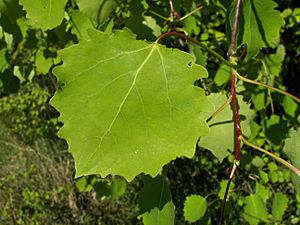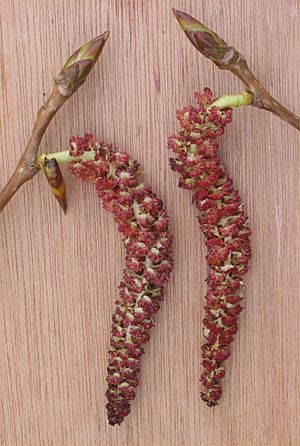Populus facts for kids
Quick facts for kids Populus |
|
|---|---|
 |
|
| Foliage of Populus tremula | |
| Scientific classification | |
| Kingdom: | |
| (unranked): | |
| (unranked): | |
| (unranked): | |
| Order: | |
| Family: | |
| Tribe: |
Saliceae
|
| Genus: |
Populus
|
| Type species | |
| Populus tremula |
|
Populus is a group of trees found mostly in the northern parts of the world. You might know them better as poplars, aspens, or cottonwoods. There are about 25 to 35 different kinds, or species, of these trees.
In 2006, scientists made an exciting discovery. They fully mapped the DNA code of a tree for the very first time! This special tree was the Western Balsam Poplar (P. trichocarpa). Understanding its DNA helps us learn more about how trees grow and live.
How Poplar Trees Reproduce
Poplar trees have special ways of making new trees. Their flowers usually appear in early spring, even before the leaves grow. These flowers hang down in long clusters called catkins.
Most poplar trees are dioecious. This means that a single tree will have either only male flowers or only female flowers, but not both. Male flowers have many tiny parts called stamens that hold pollen. Female flowers have a single part called an ovary, which can grow into a fruit.
The wind helps these trees reproduce by carrying pollen from the male flowers to the female flowers. This process is called Pollination. After pollination, the female flowers develop into small, green or reddish-brown fruits. These fruits open up in summer and release tiny, light brown seeds. Each seed has soft, white hairs, which act like tiny parachutes, helping the wind carry them far away.
Where Poplar Trees Grow
Poplar trees are found in many different places. The cottonwood types often grow near water, like in wetlands or along rivers. Aspens are very important trees in the cold, northern forests called the boreal forests.
Poplars and aspens are also important food sources for many insects. For example, the young forms, or larvae, of many Lepidoptera species (like butterflies and moths) eat their leaves. You can also find a special kind of mushroom called the aspen oyster mushroom (Pleurotus populinus) growing only on dead poplar wood in North America.
Images for kids
-
Populus × petrowskiana ("Czar's Poplar") in Heinola, Finland
-
Poplars dominate the flora of Khorog City Park, Gorno-Badakhshan, Tajikistan
-
Traditional Pamiris house
See also
 In Spanish: Álamo para niños
In Spanish: Álamo para niños
 | John T. Biggers |
 | Thomas Blackshear |
 | Mark Bradford |
 | Beverly Buchanan |












